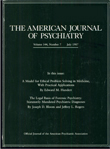Temperament and intellectual development: a longitudinal study from infancy to four years
Abstract
Using three temperamentally different subgroups from a large birth cohort, the authors undertook a longitudinal study of the association between temperament measured in children at 4 and 8 months and IQ assessed at 4.7 years. The data suggested a strong effect of extreme temperament traits on IQ development in middle and upper socioeconomic classes and in families with superior functioning in terms of communication. The temperamentally difficult group unexpectedly displayed higher IQs, and the well-replicated effect of socioeconomic status on IQ development was observed mainly in this group. These data support the hypothesis that difficult infants activate special family resources, which stimulates intellectual development over the years.
Access content
To read the fulltext, please use one of the options below to sign in or purchase access.- Personal login
- Institutional Login
- Sign in via OpenAthens
- Register for access
-
Please login/register if you wish to pair your device and check access availability.
Not a subscriber?
PsychiatryOnline subscription options offer access to the DSM-5 library, books, journals, CME, and patient resources. This all-in-one virtual library provides psychiatrists and mental health professionals with key resources for diagnosis, treatment, research, and professional development.
Need more help? PsychiatryOnline Customer Service may be reached by emailing [email protected] or by calling 800-368-5777 (in the U.S.) or 703-907-7322 (outside the U.S.).



